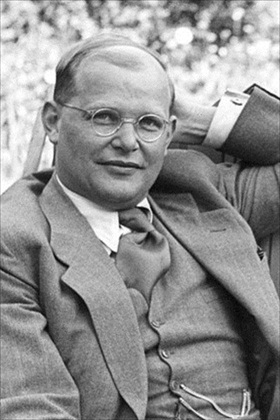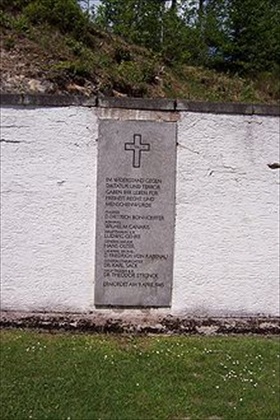GESTAPO ARRESTS OUTSPOKEN THEOLOGIAN
Berlin, Germany · April 5, 1943
On this date in 1943 in Berlin, Lutheran pastor Dietrich Bonhoeffer was arrested at his parents’ home by two Gestapo agents. Bonhoeffer was a deeply convicted theologian and a founding pastor of the Confessing Church (Bekennende Kirche), which rejected the Third Reich’s efforts to Nazify the German Lutheran Church. Best known for his widely influential 1937 (in Germany) exposition of the difference between “cheap grace” and “costly grace,” Bonhoeffer’s The Cost of Discipleship explored what it meant to live a genuinely Christian life in a dangerous and evil world (think Adolf Hitler’s Germany).
Apart from his theological writings, Bonhoeffer was a fierce critic of the Nazis’ euthanasia program and the genocidal persecution of Jews. (His twin sister married a descendent of German Jews.) Not surprisingly, the Nazis forbade Bonhoeffer to speak in public in 1940 and the next year withdrew his ability to publish. Urged by his conscience to work against the Nazi regime, he joined the Abwehr (German Military Intelligence), an emerging center of anti-Hitler resistance. It was an act that shocked his Christian friends and colleagues. But his new occupation allowed him to spy for the Allies under the protection of Abwehr chief and double-agent Adm. Wilhelm Canaris, who would share Bonhoeffer’s fate. Bonhoeffer therefore had crucial knowledge of, and roles in, several attempts on Hitler’s life, including the July 20, 1944, Valkyrie plot by the anti-Hitler coterie of Col. Claus von Stauffenberg, in which Canaris was involved.
Charged initially with relatively innocuous offenses when he was picked up in April 1943, Bonhoeffer spent 18 months in Berlin’s military prison in Tegel before being locked up in a detention cell at the Gestapo’s high-security prison on Prinz-Albrecht-Strasse. By then his connection with the “officers’ plot” to kill Hitler had come to light. In February 1945 he was secretly transferred to the Buchenwald concentration camp. He was summarily tried by an SS drumhead court-martial late on April 8, then hanged with Adm. Canaris and several other July 20th plotters at Bavaria’s Flossenbuerg concentration camp in the early morning hours of April 9, 1945, two weeks before that camp’s liberation by the Americans and one month before the war in Europe ended.
Dietrich Bonhoeffer (1906–1945), Lutheran Theologian, Pastor, German Resistance Martyr
 |  |
Left: Dietrich Bonhoeffer, late 1930s. Picture was taken some time after the Confessing Church (Bekennende Kirche) had split off from the German Evangelical Church (Reichskirche), which had become a state organ. The Confessing Church, in which Bonhoeffer was a leading voice, represented a major source of Christian opposition to the Nazi regime and its ecclesiastical policies.
![]()
Right: Flossenbuerg concentration camp, Arrestblock Courtyard: Memorial to members of the German resistance executed on April 9, 1945. Names on the granite block are Gen. Hans Oster, deputy head of the Abwehr under Wilhelm Canaris; Adm. Wilhelm Canaris; Dr. Dietrich Bonhoeffer; Dr. Karl Sack, German jurist slated for the role of Justice Minister in a planned post-coup civilian government; Dr. Theodor Struenck, who worked under Gen. Oster; and Gen. Friedrich von Rabenau, a member of the German resistance who was shot on specific orders of Reichsfuehrer-SS Heinrich Himmler on April 15, 1945.
Bonhoeffer Biographer Eric Metaxas on Bonhoeffer’s Role as Anti-Nazi Resister
![]()

 History buffs, there is good news! The Daily Chronicles of World War II is now available as an ebook for $4.99 on Amazon.com. Containing a year’s worth of dated entries from this website, the ebook brings the story of this tumultuous era to life in a compelling, authoritative, and succinct manner. Featuring inventive navigation aids, the ebook enables readers to instantly move forward or backward by month and date to different dated entries. Simple and elegant! Click
History buffs, there is good news! The Daily Chronicles of World War II is now available as an ebook for $4.99 on Amazon.com. Containing a year’s worth of dated entries from this website, the ebook brings the story of this tumultuous era to life in a compelling, authoritative, and succinct manner. Featuring inventive navigation aids, the ebook enables readers to instantly move forward or backward by month and date to different dated entries. Simple and elegant! Click 











